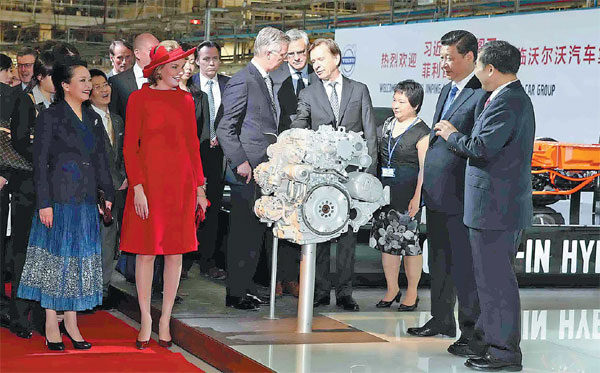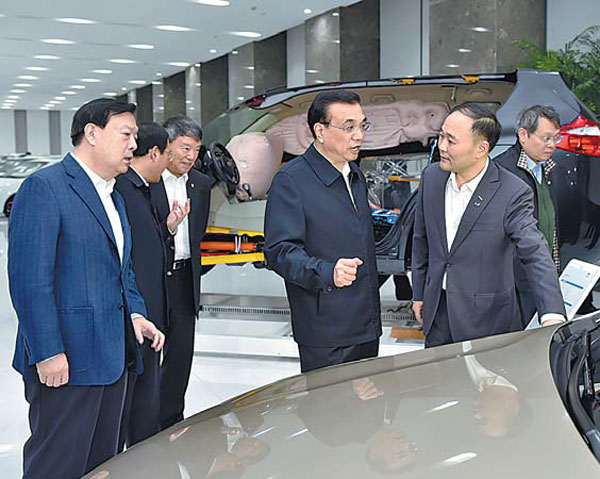Making room for growth

Chinese companies can learn from global partners
The impact of the Chinese auto industry on sales, output and profitability were the focus for global industry leaders at the Shanghai Auto Show, where they also showcased their latest products and forecast trends for 2015.
The large number of Chinese consumers and their rising demand are vital for the growth of the industry and will compensate for the volatile market conditions in many other parts of the world, particularly Europe.

| Top: President Xi Jinping, accompanied by Li Shufu, visits a Volvo car plant in Ghent, northern Belgium, in April 2014. Above: Premier Li Keqiang and Li Shufu at Geely's headquarters in Zhejiang in November. Photos provided to China Daily |
The pace of development in the Chinese car industry has been unpre-cedented, with the sales market increa-sing from less than 380,000 cars a year in 1996 to almost 22 million in 2014.
Despite this growth, car ownership in China still lags behind other developed regions, with just 140 vehicles per thousand people compared to more than 800 cars per thousand in the United States and more than 600 cars per thousand in Europe.
The Chinese market still has plenty of room to grow. The car industry must adapt to changing market conditions - not least the constraints on economic development caused by pressures on energy, the environment, resour-ces, skills and distribution as well as increasingly discerning customers.
The car industry cannot assume that rising demand will continue to outstrip supply when it comes to sales in China. Nor can brands assume that Chinese consumers are becoming more discerning and more rational in the approach to vehicle ownership, particularly when it comes to the environment, energy and safety.
So China, the largest car market in the world, is no longer a one-way street for global companies seeking to maximize sales. Instead, manufacturers are investing billions to open Chinese factories, establish joint ventures and further develop their sales networks to encompass inland and in Western regions of the country. At the same time, Chinese manufacturers are learning how to improve quality, to use new technologies and establish viable export businesses. They are also learning the benefits of interdependence with international brands.
This mutual benefit is central to Chinese enterprise, which is why companies operating in China need to embrace international standards of corporate culture and technology. This is one reason why Chinese companies are increasingly willing to pursue partnerships, alliances and acquisitions.

Zhejiang Geely, the company I founded, symbolizes this approach to a global enterprise culture. In recent years, having established one of the largest privately owned car groups in China, we have acquired the London Taxi Company, DSI - the Australian automatic transmission business, and most notably, the Volvo Car Corporation of Sweden. Building on that expansion, we acquired Emerald Automotive - the UK producer of lightweight hybrid electric vans on Feb 28, 2014, and we announced a 250 million pound investment ($384 million) in London Taxis on March 26, 2015, the first greenfield investment by a Chinese automotive manufacturer in Western Europe.
For the first time, Chinese companies look to learn and grow from their international subsidiaries, to which we can also contribute market synergies on how to best grow in China.
As owner of Volvo, Emerald and London Taxi, we can pursue synergies in many areas, including research and development, shared technologies, or international procurement.
Our work with Volvo demonstrates this approach, sharing best practice in terms of financing, product development, technologies and marketing, while allowing Volvo to grow independently within its own product and brand strategy.
This is quite different from how most automotive groups treat their subsidiaries.
This is why Volvo is benefiting from an $11 billion transformation under Geely's ownership, enabling it to unveil a new series of models including the flagship XC90 SUV, which has already garnered strong reviews from global automotive media. As part of the shared enterprise culture between Volvo and Geely Auto, the Hong Kong-listed arm of Zhejiang Geely, we established a joint research institute in Sweden in 2013, which started with just nine engineers but now boasts 1,100 engineers as of April 2015.
This is an important symbol of China's approach to enterprise culture. It is not an imposed model. Chinese companies are not demanding access to technology with nothing in return. It is about shared knowledge and shared best practice. It combines branding and technology developed in one specific locality, with increasing market familiarity in growth regions, shared investments and purchasing scale, all enacted on a global stage.
Simply having local iconic brands and a global presence is not enough. We have learned at Volvo, at London Taxis and with Geely itself that this cooperation also depends on individuals working together on cross cultural and multi-national projects. So we have launched a global center the first of its kind in China to research and study the benefits of cross cultural integration.
The Sanya Research Center for Global Corporate Culture at Sanya University, founded by Zhejiang Geely, has attracted more than 20 international professors to help with international corporation research, practice and to explore different forms of corporate interaction.
It means greater automation and connectivity, so that cars can become round-the-clock assistants and a workspace, contributing to economic activity rather than just being a mode of transport. It is not only consumers in developed economies such as the US or Western Europe that are expecting brand new technology from their car-makers, it is also true in China. This requires that the companies serving those markets, whether it is Geely or Volvo, can combine high customer satisfaction, strong innovation and skills, and a willingness by management and employees to harness new science and technology.
Without compromising the unique appeal of different Chinese or European brands, such as Geely and Volvo, we need to secure the benefits of localized R&D, localized talent, sourcing and market knowledge combined with global market access, global supplier relationships and globally-experienced management.
There has been an incorrect assumption about Chinese companies working with European partners, that China gains little reciprocal benefit particularly in terms of intellectual property and technology. Our work with Volvo disproves this misconception. We are ensuring that Volvo retains its brand identity and its world leadership in safety and the environment, without any threat or interference from Geely. At the same time, our China market knowledge is helping Volvo to grow in the world's largest market.
When Volvo's market share in China reaches the same percentage as its presence in Europe, it will be selling almost half a million vehicles a year. Already, Volvo sales in China have jumped by over 32 percent in 2014 alone, as consumers recognize the distinctive appeal on safety, design and environmental performance.
Volvo, like other Western car companies, learned that you cannot just be present in China to be successful. Similarly, we know that Chinese companies cannot be successful in exports without world-class technology, transparency and good corporate governance. So, the Chinese market is proving to be a case study for interdependence in the car industry and beyond, including areas such as natural sciences and education.
This approach to enterprise and corporate culture is about sharing local knowledge from technologies to customer relations and maximizing the benefit on a global stage. The relationships between Geely and Volvo or London Taxis, two high-profile European companies, are signs of this evolving interdependence.
The author of this article is the Chairman of Geely Holding Group.
(China Daily European Weekly 05/01/2015 page24)
Today's Top News
- Japan tempting fate if it interferes in the situation of Taiwan Strait
- Stable trade ties benefit China, US
- Experts advocate increasing scope of BRI to include soft power sectors
- New engine powers cargo drone expansion
- China to boost green industry cooperation
- Manufacturing PMI rises in November































